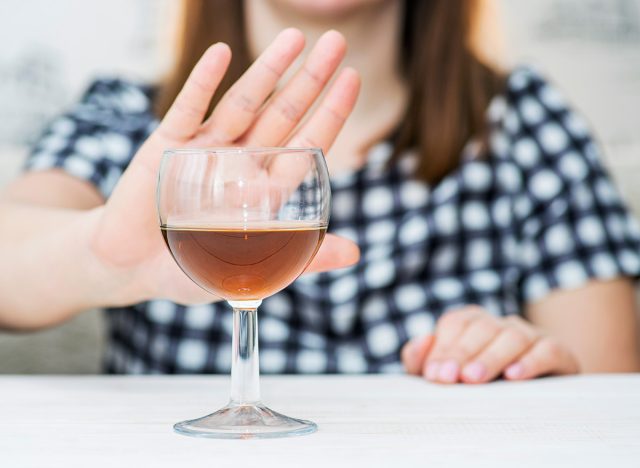Even "Light" Drinking Can Cause This Heart Health Risk, New Study Says

You have surely heard the saying that "everything in moderation is key," but new research has found that might not be the case when it comes to alcohol.
New research from the United Kingdom reveals that even limited servings of alcohol could result in cardiovascular events. Read on to learn more about the study, and then check out The #1 Best Juice to Drink Every Day, Says Science.
Study authors from Anglia Ruskin University analyzed the health data of more than 333,200 adults between the ages of 40 and 69 who drank alcohol and had not been previously diagnosed with a heart condition. The volunteers were asked to report on their average weekly intake of wine, beer, and spirits. Over a seven-year period, the investigators followed up with these participants to record any hospitalizations due to a heart-related issue.
According to their findings, which were published in the journal Clinical Nutrition, the adults who drank less than 14 units of alcohol each week (which is equivalent to six pints of average-strength beer or 10 glasses of lower-strength wine, according to England's National Health Service), each additional 1.5 pints of beer at 4% strength was associated with a 23% increased risk of dealing with a cardiovascular event that involved either the heart or blood vessels.

"The so-called J-shaped curve of the cardiovascular disease-alcohol consumption relationship suggesting health benefit from low to moderate alcohol consumption is the biggest myth since we were told smoking was good for us," says lead study author Dr. Rudolph Schutte in a press release. "Avoiding these biases in future research would mitigate current confusion and hopefully lead to a strengthening of the guidelines, seeing the current alcohol guidance reduced."
The 2020-2025 Dietary Guidelines for Americans define drinking in moderation as one (or less) alcoholic beverage a day for women and two (or less) for men. Data reported by the Centers for Disease Control and Prevention reveals that two out of three U.S. adults who consume alcohol drink above the moderate level at least once a month.
Lisa Young, PhD, RDN, a member of the Eat This, Not That! medical review board, is not surprised by the study's findings.
"Recommendations tend to be based on averages, and some people may react differently to different foods or beverages," she tells Eat This, Not That!. "This study is showing that having less than the guidelines are better for some people."
As a general rule, she says that less wine, beer, and spirits tend to be the healthier option.

"No one has gotten heart disease from a deficiency of alcohol," Young says. "While we also know that moderate drinking might be okay for heart health, it can increase the risk for hypertension, as well as certain cancers."
Young suggests creating your own booze-free beverages if you're looking to lower your alcohol consumption. For example, swap tequila for sparkling apple juice to make an apple margarita mocktail.
"My favorite non-alcoholic drink is a Virgin Bloody Mary," says Young. "If you're concerned about the sodium and spiciness, use low-sodium V8 juice—and don't forget to add the olive and celery."
Keep in mind that seltzer can serve as a go-to fizzy ingredient, Young adds: "I recommend mixing sparkling water with mint, lemon, and herbal iced tea. Also, a great way to have a drink with less alcohol is to switch from a glass of wine to a wine spritzer."
For some more on non-alcoholic options, check out 13 Best Non-Alcoholic Beers for Zero-Proof Drinking.







